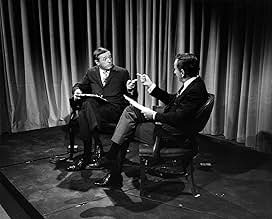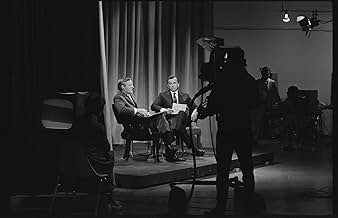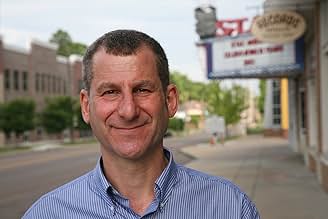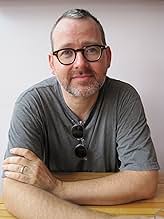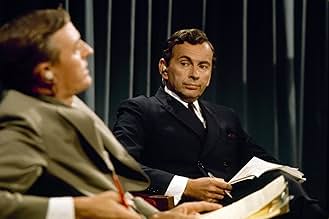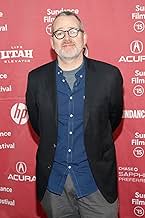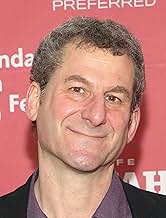IMDb रेटिंग
7.6/10
6.6 हज़ार
आपकी रेटिंग
अपनी भाषा में प्लॉट जोड़ेंA documentary on the series of televised debates in 1968 between liberal Gore Vidal and conservative William F. Buckley.A documentary on the series of televised debates in 1968 between liberal Gore Vidal and conservative William F. Buckley.A documentary on the series of televised debates in 1968 between liberal Gore Vidal and conservative William F. Buckley.
- निर्देशक
- लेखक
- स्टार
- पुरस्कार
- 6 जीत और कुल 27 नामांकन
Gore Vidal
- Self - Debater
- (आर्काइव फ़ूटेज)
William F. Buckley
- Self - Debater
- (आर्काइव फ़ूटेज)
Noam Chomsky
- Self
- (आर्काइव फ़ूटेज)
Patricia Buckley
- Self - Buckley's Wife
- (आर्काइव फ़ूटेज)
Sam Donaldson
- Self - Correspondent, ABC News
- (आर्काइव फ़ूटेज)
Howard K. Smith
- Self - Anchor, ABC News
- (आर्काइव फ़ूटेज)
फ़ीचर्ड समीक्षाएं
"Best of Enemies" is incredibly effective at achieving multiple thematic ends without coming off as dense. Here's a few of things it managed to touch on.
It's a sound, but passive, attack on the current state of our discourse, giving us a history lesson on the genesis moment of television punditry.
It's a fascinating look inside network news in the time of American political convention "gavel- to-gavel" coverage. The last time that ever happened.
It's an exploration of how TV changes us, or at the very least, reveals us to ourselves, both as people who long to sit in front of its cameras, and as a nation who watches its images.
It's about how the two sides of the late 60's culture war found their primetime voices.
It's about class, and how where we come, or how we where we wish we had come from, affects how and what we think.
It's about the personal journeys of the intellectuals at the center of it - gay-left leaning best selling counter-culture author Vidal and establishment defending policy-affecting conservative Buckley - and how their confrontation never really left the center stage of their own minds.
But most spectacularly, it's about how the issues of a turbulent period (our republic caught in an ongoing war of attrition, race riots in the streets, the all too familiar rhetoric of income and racial inequality at the center of the political debate) never really ended.
And it does all of those things with a sense of real legitimacy, never once feeling like it's assigning more importance to the story than it deserves. A perennial fault in the doc genre. But it's not just a good story. It's a good story told well.
The whole thing is brilliantly structured, wonderfully cut together, incredibly funny and tragic, and far-reaching in its ambition. It's political positioning is measured, either because of or in spite of it's co-director being affiliated with the conservative think tank, The Heritage Foundation.
It features great talking heads, including political historian Sam Tanenhaus (who I sorely miss as the New York Times Book Review editor) and avowed socialist/Marxist/anti-leftist/cultural contrarian Christopher Hitchens, who manages to bloviate even from beyond the grave.
This is one of my favorite documentaries of the year. A perfect double feature with last year's excellent, "Last Days in Vietnam". Catch it if it interests you. It didn't do as well at the box office as it should've.
It's a sound, but passive, attack on the current state of our discourse, giving us a history lesson on the genesis moment of television punditry.
It's a fascinating look inside network news in the time of American political convention "gavel- to-gavel" coverage. The last time that ever happened.
It's an exploration of how TV changes us, or at the very least, reveals us to ourselves, both as people who long to sit in front of its cameras, and as a nation who watches its images.
It's about how the two sides of the late 60's culture war found their primetime voices.
It's about class, and how where we come, or how we where we wish we had come from, affects how and what we think.
It's about the personal journeys of the intellectuals at the center of it - gay-left leaning best selling counter-culture author Vidal and establishment defending policy-affecting conservative Buckley - and how their confrontation never really left the center stage of their own minds.
But most spectacularly, it's about how the issues of a turbulent period (our republic caught in an ongoing war of attrition, race riots in the streets, the all too familiar rhetoric of income and racial inequality at the center of the political debate) never really ended.
And it does all of those things with a sense of real legitimacy, never once feeling like it's assigning more importance to the story than it deserves. A perennial fault in the doc genre. But it's not just a good story. It's a good story told well.
The whole thing is brilliantly structured, wonderfully cut together, incredibly funny and tragic, and far-reaching in its ambition. It's political positioning is measured, either because of or in spite of it's co-director being affiliated with the conservative think tank, The Heritage Foundation.
It features great talking heads, including political historian Sam Tanenhaus (who I sorely miss as the New York Times Book Review editor) and avowed socialist/Marxist/anti-leftist/cultural contrarian Christopher Hitchens, who manages to bloviate even from beyond the grave.
This is one of my favorite documentaries of the year. A perfect double feature with last year's excellent, "Last Days in Vietnam". Catch it if it interests you. It didn't do as well at the box office as it should've.
The legacy of William F. Buckley, Jr. is not necessarily his 'National Review'; it isn't his devotion to the Buckley pere's hatred of FDR's New Deal, an act deemed a patrician's treachery to his class; it is the implosion of what his brother Reid concretes him as a revolutionary who ushered in the conservative revolution that we see in the impossible array of 17 candidates for the 2016 Republican nomination for the American presidency and the rise of Donald Trump. But, in 'Best of Enemies' trans-political make over is a glint in Buckley's eye as he faced the talented Gore Vidal as they 'commented' on the 1968 Republican convention in Miami and then the Democratic convention in Daley's Chicago. Who has read Buckley's apologia pro sua vita as spy for the FBI 'God and Man at Yale' today? Brilliant, effete, an amateur of the harpsicord,a seasoned sailor, he thought of himself the American heir to the little read GK Chesterton, in his affected speech. He could demolish in high disdain the arguments of his guests on 'Firing Line', guests like Norman Mailer, Allan Ginsberg and the like. Buckley was a man of the right--God, Country, Law and Order, who fought those critics of his values not necessarily in the name of freedom and humanity but in defense of older medieval values by attacking contemporary secular culture. And the embodiment of his distaste was the writer, playwright and commentator on things cultural and political Gore Vidal. ABC pitted these two 'aristocrats' of polished English as a wedge in the wall-to-wall coverage of the conventions by rivals CBS and NBC, at a time nightly television news was accepted more or less straight by the American people. From the get go, it was obvious that these two mavens of the Verb mutually loathed one another. Buckley shucking and sliding verbally, eyes popping, a supercilious grin on his lip as he flung mud at Vidal, not so much on what he said about the convention but for what he stood for. Remember, Gore Vidal had broken taboos for his 'Myra Breckenridge', about a transgendered man, light years ahead of the much admired Caitlin Jenner, a Republican. To Buckley, the writer of note was an enemy of God and patrician values and yes even to an elite education which Gore Vidal didn't pursue--he was a drop out who joined the Army during WW2, serving in Alaska where he wrote his much praised 'Williwaw'. Vidal was a 'revolutionary' in his own way; he published 'The City and the Pillar', which had a homosexual theme, that so exasperated the Old Grey Lady, the New York Times, which boycotted reviewing any of his books till decades later when they couldn't ignore his obvious talent. And in Gore, Buckley met more than his equal, so much so that until his death he wouldn't pronounce the V word. Buckley and Vidal were bellwethers; each had a finger on the rage and discontent of the times. And according to the talking heads, their 10 debates radically changed political discourse that now plagues our own day. 'Best of Enemies' is more than nostalgia, it is a palimpsest for the soul of the American soul. Buckley was an admirer of authoritarianism that Vidal was not. And it was to Vidal's credit that he pierced the supercilious armor of Buckley that, despite the adulation of his peers, rendered a life of hobnobbing with the rich and famous, the anti-Semites and racists, made him lose his 'cool' and restful nights of sleep. Even though he called Vidal a 'queer' (which wasn't a slur a half-century ago), Vidal suspected that he was a closet case, going as far as saying he was an incarnation of Myron Breckenridge. (For those who want to read about the conventions in Miami and bloody Chicago,Norman Mailer's 'Miami and the Siege of Chicago' is not a bad place to begin.
Best of Enemies is a fascinating documentary film about a series of nationally televised debates in 1968 between two public intellectuals, the liberal Gore Vidal and the conservative William F. Buckley Jr. If that doesn't sound very interesting you couldn't be more wrong. This is a film about two men who absolutely hated each other. Two extremely clever men who fought each other live on television by debating with each that eventually led to personal insults being thrown at each other and it's mesmerising viewing. I have to admit I had never heard of these men before and that's probably because these debates happened a couple of months before I was born but I do know now and I feel much better off for it.
A well-constructed must-see documentary for anyone who is the least bit interested in the politics of journalism. Don't worry that you won't recall/aren't aware of the background. The filmmakers do an excellent job of setting the stage, and an even more impressive job of avoiding the actual political issues in order to focus on the medium. If you want to know how we got where we are, start at the beginning. This is the genesis of punditry and personality-driven journalism. This is not to say that this little slice of evolution is necessarily bad. As the film points out, prior to 1968 the presentation of news was quite static, with little, if any, chance for anything out of the mainstream to make it out of the studio. Now the genie has been loosed from the bottle, and he has truly been feeling his oats for the past several years. It's up to us to rein him in, give him focus, and pray that we can find some common ground before the growing political mitosis reaches the point of no return.
Turn back the clocks fifty years and we find the birthplace of today's angry, confrontational news programming. In the late sixties, standard operating procedure for network television reporting was straight, impartial, monotone and almost entirely fact-driven. ABC, at the time a very distant third to perennial front-runners NBC and CBS, gambled on rowdy, opinion-driven segments during their convention coverage and won... or did we all lose?
At the heart of it all we find the conservative intellectual, William F. Buckley, and his opponent / counterpoint, the liberal author Gore Vidal, who embark upon a series of fiery debates: one for each night of their respective parties' conventions. In retrospect, their early arguments seem downright civilized - both are eloquent, engaging, brilliant conversationalists and they make for a fascinating contrast - but as the routine bears on and the speakers' attacks grow more personal, the cordiality of their discourse deteriorates. Finally, after slyly baiting his hooks for several such confrontations, one speaker elicits a jolting moment of unguarded, contemptuous rage from his opponent and, knowing his battle won, smugly settles in to enjoy the moment.
It's difficult to get completely behind either man, really. Each spins a mesmerizing oral web, but they also fall into the trap of continually one-upping each other, and that betrays the spirit of the debate. Personally, I'd love to spend a dinner party with either, but wouldn't want to make a habit of it. Deeply interesting historical material that answers many questions about how we arrived at this era of brash 24-hour opinions and endlessly question-dodging presidential debates.
At the heart of it all we find the conservative intellectual, William F. Buckley, and his opponent / counterpoint, the liberal author Gore Vidal, who embark upon a series of fiery debates: one for each night of their respective parties' conventions. In retrospect, their early arguments seem downright civilized - both are eloquent, engaging, brilliant conversationalists and they make for a fascinating contrast - but as the routine bears on and the speakers' attacks grow more personal, the cordiality of their discourse deteriorates. Finally, after slyly baiting his hooks for several such confrontations, one speaker elicits a jolting moment of unguarded, contemptuous rage from his opponent and, knowing his battle won, smugly settles in to enjoy the moment.
It's difficult to get completely behind either man, really. Each spins a mesmerizing oral web, but they also fall into the trap of continually one-upping each other, and that betrays the spirit of the debate. Personally, I'd love to spend a dinner party with either, but wouldn't want to make a habit of it. Deeply interesting historical material that answers many questions about how we arrived at this era of brash 24-hour opinions and endlessly question-dodging presidential debates.
क्या आपको पता है
- ट्रिवियाThe film-makers shot an interview with Gore Vidal, but ultimately decided not to use it, so he only appears in archive footage.
- भाव
Richard Wald: ABC was the third of the three networks. It would've been fourth, but there were only three.
- क्रेज़ी क्रेडिटThere is a short scene after the credits showing footage of an interview with Buckley.
- कनेक्शनEdited into Independent Lens: Best of Enemies (2016)
टॉप पसंद
रेटिंग देने के लिए साइन-इन करें और वैयक्तिकृत सुझावों के लिए वॉचलिस्ट करें
- How long is Best of Enemies: Buckley vs. Vidal?Alexa द्वारा संचालित
विवरण
- रिलीज़ की तारीख़
- कंट्री ऑफ़ ओरिजिन
- आधिकारिक साइट
- भाषा
- इस रूप में भी जाना जाता है
- Best of Enemies: Buckley vs. Vidal
- उत्पादन कंपनियां
- IMDbPro पर और कंपनी क्रेडिट देखें
बॉक्स ऑफ़िस
- बजट
- $10,00,000(अनुमानित)
- US और कनाडा में सकल
- $8,92,802
- US और कनाडा में पहले सप्ताह में कुल कमाई
- $50,378
- 2 अग॰ 2015
- दुनिया भर में सकल
- $8,92,802
- चलने की अवधि1 घंटा 27 मिनट
- रंग
इस पेज में योगदान दें
किसी बदलाव का सुझाव दें या अनुपलब्ध कॉन्टेंट जोड़ें



